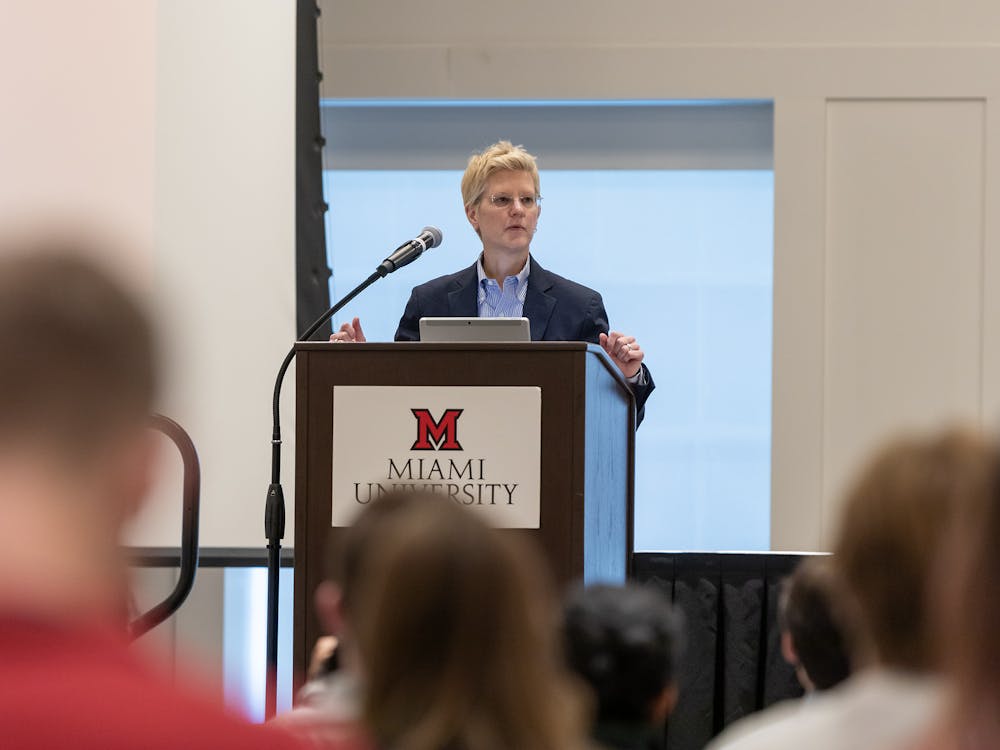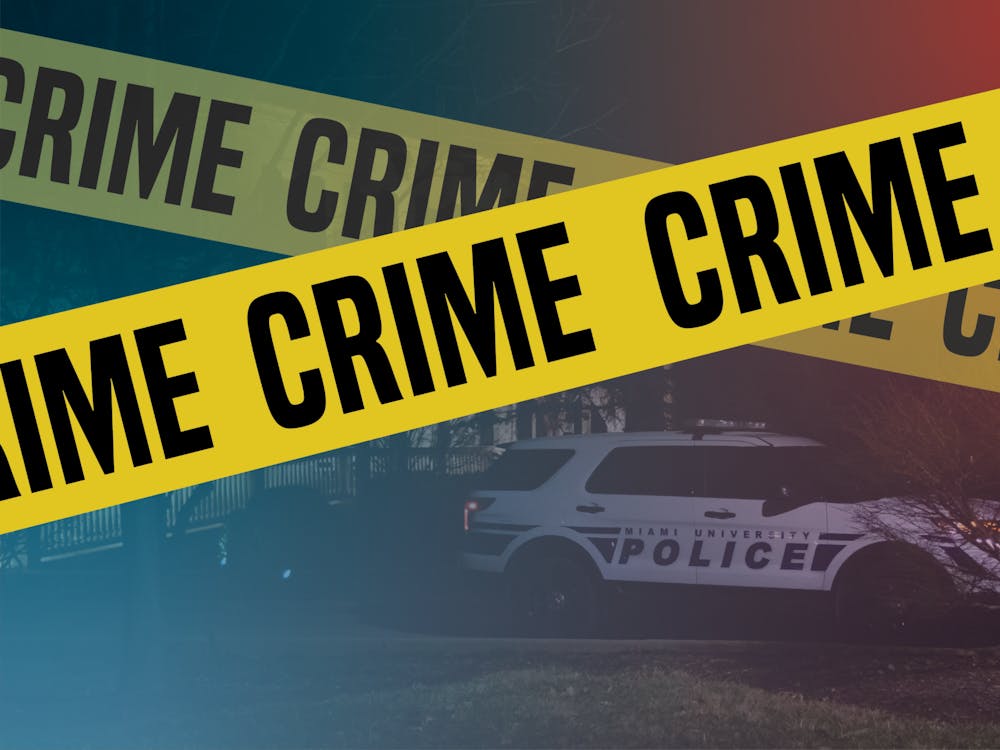On Oct. 10, Miami University’s annual Inclusion Forum highlighted students in marginalized communities, told their stories and reinforced allyship. The event included a surplus of guest speakers, a cultural dance performance by a Nepalese student association and a discussion panel.
Before the speakers began, a land acknowledgment was read to honor the Miami Tribe of Oklahoma.
The night started off with a speech from Jack Isphording, the Associated Student Government (ASG) chief of staff, describing why this year's theme was “Inclusion with Intention.” He said the theme was chosen by the planning committee to emphasize intersectionality during different events and efforts.

Jules Jefferson, student body vice president, discusses with BaShaun Smith, Miami's dean of students, during the tabling portion of the program.
To encapsulate the theme, ASG brought in keynote speaker Cynthia Deitle, retired FBI agent and director of associate general council at Meta, to touch on building communities one friend at a time.
“Intentional inclusion. We see the beauty in our world when we put these two together, we find joy,” Deitle said. “Healthy society thrives when a web of institutions provides a support structure for individuals, families, schools, faith communities, workplaces, neighborhoods, media organizations, clubs.”
The Minority Association of Pre-Health Students (MAPS) conducted its presentation on underrepresentation in medicine. Stella Lukusa and Elijah Gahn, the MAPS president and vice president, presented statistics concerning representation of minorities within medical professions. Lukusa said the overarching issue at hand is the disparities within healthcare and how they can lead to medical mistrust.
“Essentially our goal is to be a pipeline to make a dream a reality for students hopeful to change the trajectory of what medicine looks like today,” Lukusa said.
MAPS wasn’t the only group to present. The Vietnamese Student Association spoke about Vietnamese cuisine and embracing family values. A representative for the organization said that at Miami, the key to an inclusive community is spreading and receiving different cultures.
The Asian American Association (AAA) talk was led by Hanah Bloom, president of AAA, and Michelle Nguyen, vice president, who talked about the roots of anti-Asian racism and how it is still prevalent in society today.
“There is a strong linkage in theory with the API research field about how U.S. history of economic and political anxiety actually leads to scapegoatism and the targeting of Asian Americans,” Nguyen said. “It’s [not confined to] history, it's actually still here today.”
Addressing the conflict in Israel and Palestine
Enjoy what you're reading?
Signup for our newsletter
During the short break, a group of ASG leaders, cops and administrators talked with Chabad in the back of the room.
August Ogunnowo, the secretary for diversity, equity and inclusion, said Chabad wanted to present last minute at the forum since the Students for Justice in Palestine were presenting.
Student Body President Nyah Smith made an impromptu speech clarifying the process the different organizations went through in order to get on the agenda at the inclusion forum. She said organizations signed up a month ago, and if anyone wanted to be highlighted in the future, there would be opportunities.
“I want to let everyone know we love highlighting our student organizations,” Smith said. “We love giving space for our small organizations to share and speak.”
When the president for Miami University Students for Justice in Palestine started talking, more than five people left the room.
During the presentation, Maysa Constandinidis talked about navigating Palestinian rights and discussed the difference between antisemitism and genuine criticism of Israel.
“The weaponization of antisemitism has a chilling effect on advocacy for Palestinian rights. When individuals fear of being falsely labeled as antisemitic for expressing concerns about Israeli policies, it stifles the dialogue that is necessary for change,” Constandinidis said.
Guest panelists speak on inclusion
The event ended with a guest panel moderated by Olivia Patel and Anna Reier, staff writers for The Miami Student. The four guests were Annastashia Blesi, assistant director of Student Disability Services and adjunct professor of disability studies; Haley Shea, Myaamia research associate and visiting assistant professor in the Department of Educational Psychology; BaShaun Smith, Dean of Students, and Smith.
The panel spoke about what “Inclusion with Intention” meant to them, as well as what the university can do to take practical steps toward embracing it. The panel speakers touched on the importance of providing resources for the community, personally interacting with students and consciously creating inclusive spaces.
“As a student leader, I would say that it's recognizing that each student's Miami experience here is very different,” Smith said. “Each of us navigate the system that makes Miami very unique because of the identities that we come with.”
Reilly Powers, a junior double major in art education and studio art, was part of the planning committee organized by ASG and was very tired after the weeks of planning the forum but would still do it again.
“It took a chunk out of our life, like my life was this for a while,” Powers said. “And that sounds crazy, but it was really fulfilling.”




